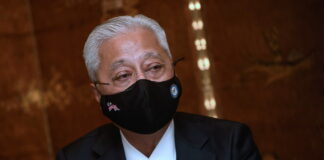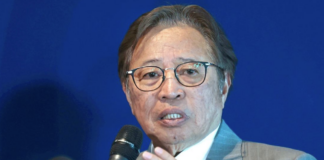KUALA LUMPUR, May 20 — Asia should lead the way in opening up patent protections to produce cheaper generic versions of life-saving medicines for critical diseases, from COVID-19 to HIV/AIDS, said Prime Minister Tan Sri Muhyiddin Yassin.
Welcoming US President Joe Biden’s administration’s stated intention to support the temporary waiver of intellectual property (IP) protection for COVID-19 vaccine, he said this should give way to a total transformation of the pharmaceutical patent system.
“Pausing the gears is not enough. Our obligation is to dismantle it entirely,” he said in a video address to Nikkei’s Future of Asia conference in Tokyo today.
Muhyiddin said based on the United Nations (UN) Article 25(1) of Universal Declaration of Human Rights, it is high time for these innovations including drugs, vaccines and medical devices to be brought out of the purview of individual patent rights and for global property rights to be created instead.
For Asia to effectively prevent and fight pandemics, he said, it needs to shift from a purely nationalistic approach to health services to investing in health as a global public good.
“Treating health infrastructure as a global public good would mean Asia as a whole treats health the way many individual countries treat their education, security, the environment. In essence, as a critical piece of the global commons supported by a collective investment, for the benefit of all,” he said.
Stressing that COVID-19 infections must be suppressed as quickly as possible to prevent mutating variants that make the current vaccines obsolete, the prime minister, however, noted that there were man-made hurdles to this effort.
“For instance, the wealthiest 27 countries have 35.5 per cent of the vaccines, although they only cover 10.5 per cent of the world’s population. These countries have more than enough vaccine doses to immunise people beyond their own populations,” said Muhyiddin.
Muhyiddin said 20 per cent or 252 million out of 1.23 billion doses administered across 174 countries so far were taken up by the US alone.
In terms of production, he said, China and India have exported around 200 million and 66 million vaccine doses, approximately 48 per cent and 34 per cent of their total production respectively.
“In comparison, the US and UK have only exported three million and one million of their vaccine doses respectively, or a mere 1.1 per cent and four per cent of their total production respectively,” he said.
Muhyiddin also said that the failure of global leadership to address the COVID-19 pandemic was due to human biases such as tribalism, dysfunctional competition and short-term thinking.
“Of course, it is unrealistic to expect nations not to compete, or for them to forgo building their self-interests, but we must also realise that long-term victory often doesn’t mean pushing your country ahead of the line all the time, every time.
“Certainly one posits that, in the post-COVID-19 world, it will be the countries who are most generous, who build bridges rather than walls and who bring their neighbours together rather than drive them away, who will be successful,” he added.
He also said success depended on whether Asian regional institutions can strengthen themselves with more robust conflict management mechanisms and move towards a flexible view of state sovereignty.
He said by demonstrating ability to share leadership with the region’s weaker states in managing its security and economic conflicts, Asia’s emerging powers can gain global credibility and trust, and it can facilitate a substantive contribution to global governance from a position of leadership and strength.
Muhyiddin said Malaysia also pledged its best efforts to break the bonds of pandemic misery, to cut the chains of poverty and for relief of people affected by tyranny.
“We have to help in every way we can, not because we want their commerce, not because we seek to extend our geo-political influences, but because it is the right moral thing to do,” he said.
















